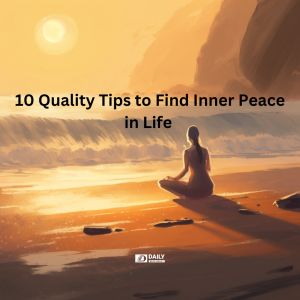Introduction:
Where do you go to calm down? Is it by advocating for global harmony, taking a trip to the Caribbean, or meditating in the Himalayas?
The concept of “inner peace” is not easily defined. Finding inner calm is not a predetermined or prescribed procedure. With our busy schedules, hectic lifestyles, and everyday worries, finding inner calm can be increasingly difficult, but it is still possible. The significance of finding and maintaining inner peace is highlighted, and methods for doing so are provided.
A condition of inner peace is bodily and spiritual tranquilly in the face of several stresses. You can experience joy, contentment, and bliss despite your challenges when you find your inner calm. Since we all face difficulties in life, achieving contentment and serenity should not depend on a lack of problems or conflicts.
One can find serenity and contentment inside themselves in a variety of ways. Your solution won’t meet some people’s needs. Peace and contentment aren’t something you can just snap your fingers and have appear in your life. You may want to investigate and experiment with the following methods in your search for meaning and fulfilment in life.
10 Quality Tips to Find Inner Peace in Life:
-
Spend Time in Nature:
You may discover calm by appreciating nature or going for short outdoor walks. The mind can be distracted from anxious thoughts by spending time in nature and focusing on deep breathing. Long-term contact with the natural world can help you cope with the stresses of everyday life.
-
Meditate:
The positive effects of meditation on our bodies, hearts, and minds are well documented. In particular, mindfulness meditation has been linked to positive mental health benefits, including reduced anxiety and the avoidance of depression. You can try yoga, learn about meditation through a book or podcast, or spend 40 to 45 minutes daily meditating independently. All of these things can aid in your search for fulfilment and contentment.
-
Be Grateful:
Happiness and self-care come from appreciating what you have rather than dwelling on what you don’t. Appreciation for one’s possessions brings contentment. Individuals who are thankful and pleased with their lives are more likely to experience inner calm and contentment.
-
Take Responsibility:
It takes a very mature person to accept full responsibility for their conduct. Admitting your faults will bring you serenity and contentment, no matter how difficult it is. You’ll be a stronger, more resilient person if you can take constructive criticism and use it to grow.
-
Don’t Be Defined By Your Mistakes:
We’ve all done things we wish to take back, but wallowing in regret will only wear you down. Don’t dwell on your past failures; don’t let them prevent you from improving.
Forgive yourself and move on with your life without holding onto regrets. Remember that the lessons you learned from your failures have made you a stronger person overall. You should learn to brush yourself off after falling since you know you will do so again.
-
Love Yourself:
Taking care of yourself is crucial to achieving inner calm and contentment. If you can’t find love for yourself, how can you expect to find love for anyone else? Taking care of your body, mind, and soul is an act of self-love. Eating well, staying active, and caring for one’s health are all part of these.
Putting oneself first and keeping a good attitude outlook on life has a ripple effect on how you treat others. Think about how much better your life could be if you had more self-confidence. Relationships with others improve when you practise healthy self-love.
-
Practice Acceptance:
Happiness and contentment can be attained by accepting things as they are. Realise that difficulties will arise and train yourself to cope with them.
Happiness can refer to a state of mind, a body, or a bank account. The pursuit of wealth and worldly possessions doesn’t energise a contented person.
-
Declutter:
Having a calm state of mind is facilitated by decluttering. This includes cleaning up, removing clutter, and organising your entire life.
Have you ever noticed how much it stresses you out to see a disorganised closet? That’s why clearing the decks can help. If you can prevent what may cause you tension, you should. Take charge of your life and organise your home, schedule, and thoughts.
Conclusion:
In the pursuit of inner peace, embrace self-reflection, practice mindfulness, and cultivate gratitude. Disconnect from external chaos, prioritize mental well-being, and nurture positive relationships. Accept imperfections, let go of control, and focus on the present moment. By incorporating these habits, one can foster a harmonious and serene existence, discovering true inner peace in life.
Discovering inner calm means facing less tension, anxiety, and dread. Achieving one’s full potential is correlated with experiencing inner calm. The advantages of achieving that equilibrium are listed below.
- Improved performance in the ordinary tasks of living
- Enhanced vitality and better control of one’s emotions
- A life with less drama, less worry, and more happy thoughts.
- A warm and sympathetic attitude towards others.
- being unaffected by the criticisms of others
- Developing coping mechanisms for intense feelings
- clarity of mind under pressure; the ability to make sound decisions
- Higher-Quality Sleep


